Wills
A Will is a legal document which directs how your property should be distributed upon your death. In Pennsylvania any individual who is at least 18 years of age and of sound mind can make a Will. If you die without having made a Will, you are said to die “intestate”. In this case the state legislature has adopted a plan for distributing your estate, the Intestate Law. In some cases the Intestate Law might distribute your property the same way that you would have directed if you made a Will. In many other cases, however, the provisions of the Intestate Law may be inadequate to carry out your wishes or may even be contrary to them.
The experienced attorneys at Mattis & Mattis strongly recommend that you make a Will to ensure that your wishes concerning the distribution of your property after your death are carried out accurately. In a Will, for example, you can set up trusts to provide for the special needs of minor and dependent children, you can make bequests to persons or organizations who are not in your immediate family, you can make bequests of specific property to specific persons, and you can withhold distribution from persons in your immediate family that you do not wish to share in your estate. None of these alternatives would be possible under the Intestate Law.
In your initial meeting with the attorneys at Mattis & Mattis, you should be prepared to discuss your specific needs and wishes for the distribution of you estate as well as the nature and extent of your assets. In this way a document can be drafted to effectuate your testamentary plan with the least possible burden of Estate and Inheritance taxes.
